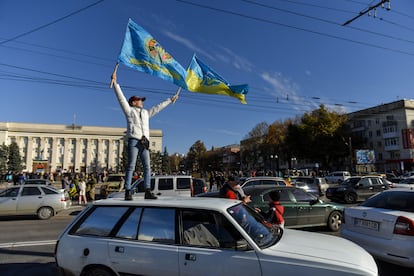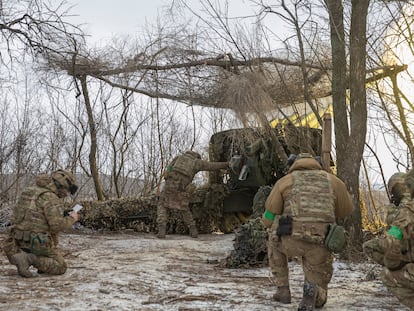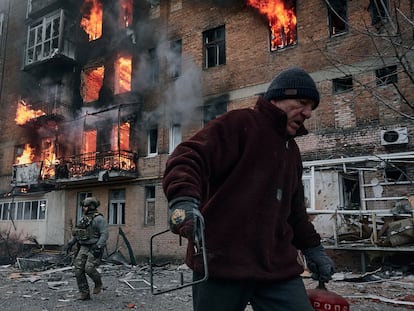The silent heroes of Kherson’s resistance: ‘They thought we would hide and cower in fear’
A network of partisans in the Russian-occupied city defied arrest and torture to provide Ukrainian intelligence with information that proved vital to its liberation

Viktor always knew that, if the time came, he would join the resistance. And when he was tortured by Russian soldiers in a basement in the occupied city of Kherson, Viktor remembers that split second a few months ago when he stopped being a businessman and became a partisan. He agreed to transport and hide weapons for Ukrainian forces and report on the positions of Kremlin troops. “They came here to make war, they killed our people,” Viktor, who is in his fifties, says as he nervously strokes his unkempt beard while walking through his destroyed garden. Two large explosions shake the ground. It has been almost three months since the Russian army withdrew from the city, but its artillery still punishes Kherson, its inhabitants and its resistance fighters, who helped force the retreat of the invaders in what was the biggest defeat inflicted on the Kremlin in a year of war.
The hand of a young woman protrudes from a wet plastic sheet, her manicured nails perfectly designed in the shape of an almond. It is a reminder of everyday life in an image widely shared by local journalists on social networks that has once again caused a feeling of sickness in the stomachs of the Ukrainian people, making the daily reality in the southern city even more macabre. A strike on Kherson’s busy bus station on Tuesday claimed the lives of six people and wounded scores more. Before the war, Kherson was home to a shipbuilding industry and had a population of around 280,000. Many who remain are now seeking ways to get out to escape the bombs. The Ukrainian government has for weeks been urging civilians to evacuate Kherson, the capital of a region that Moscow illegally annexed in September along with three more partially occupied Ukrainian provinces.
For every day that passes under Russian bombardment, Viktor repeats the same mantra: “I would do the same thing again a thousand time over.” Patience is needed, he says. And faith. Before Russian President Vladimir Putin launched the full-scale invasion of Ukraine, Viktor had run a rustic-looking bathhouse next to his pretty house and garden. Like him, dozens of people – perhaps hundreds – put their lives on the line to report the locations of apartments used by officials of Moscow’s puppet regional government, meeting points, Russian barracks and all kinds of relevant information to intelligence services and other contacts outside the city. They also noted the movement of weapons, sometimes in real time, either working alone or through a small weaving of resistance networks.
On rare occasions, some members of the resistance went a step further and killed Russian troops, blew up their vehicles and harassed the occupying forces in any way they could. The task of the majority, though, was to gather information, says one of the intelligence officers who worked with Viktor and others like him from a base in the neighboring city of Mykolaiv. The owner of a restaurant that was popular with Russians who recorded their personal details; the elderly woman who eavesdropped on the conversations of Russian troops from the first-floor window of her apartment while they smoked in the courtyard of a building also used by the occupying forces; the local magnates who helped to distribute Ukrainian weaponry. The list is endless: business owners, fishermen, housewives, local government employees, store keepers, hairdressers, pensioners…
The liaison between the resistance and Ukrainian intelligence through encrypted mobile messaging platforms – coupled with precision weapons provided to Kyiv by its Western allies – were “vital” in driving Russian troops out of Kherson, says Oleksandr Samoilenko, head of the Kherson regional council. According to Samoilenko, information provided by the resistance enabled Ukrainian forces to strike a hotel full of Russian intelligence officers, a high-level meeting of Moscow’s puppet authorities and other targets. The actions of the partisans not only led to concrete military achievements; they also sowed increasing paranoia among Russian forces. News of their achievements also led to other resistance networks in other occupied zones, and a feeling that it was possible to fight back.
The Kremlin also had its collaborators in Kherson. Some were cultivated before the invasion, others changed their allegiance when the Russians arrived and many more had their hands forced by circumstance, a factor that contributed to the rapid collapse of the city in the early stages of the invasion. In that environment of prying eyes, Viktor’s daily routine was almost always the same. He would walk around the city running errands while carrying his wife’s cellphone, taking pictures and recording video while pretending to talk or text, gathering information: a coffee shop or a supermarket frequented by Russians, names or data heard here and there, loose talk about weaponry. When he arrived home, he would send the information to his contact outside Kherson, carefully delete everything and hand the phone back to Vika, a short, blond cab driver with a ready smile.
Viktor admits he was scared. “Panicked,” he says. Occasionally he would be handed “different” tasks, such as picking up a package here and delivering it there. He didn’t ask many questions and refuses to provide details. At the time, Moscow was attempting to absorb Kherson. It introduced the ruble, cut off access to Ukrainian television, installed Russian telephone networks and imposed its own school curriculum.
According to his own account and that of the officer he worked with outside the city, when the Russians arrested Viktor last summer, he had provided reams of data, codes and coordinates to Ukrainian intelligence. The small business owner, who has lived in Kherson all his life, says that he never revealed to the occupying forces that he was a Ukrainian informant, a partisan, a member of the resistance.
In the eight months of the Russian occupation of Kherson and the almost three that have passed since their retreat, Viktor seems to have aged 10 years. Trembling, he moves around the house, looking for objects to support his story: a knife, a crumpled document. For a couple of hours, he recounts almost every day of the occupation, as if sharing it is a kind of therapy. He was tortured for two weeks. “We didn’t know where he was. Many times, I thought he was dead. I thought that they would come for me, for my son...,” says Vika.
Viktor was eventually released. He does not know whether a neighbor informed on him or whether he arrested due to the systematic policy employed by the occupying forces, who beat, electrocuted, interrogated and threatened to execute thousands of Kherson’s citizens in those dark basements. Despite the tremors, insomnia, physical and psychological wounds, he not only continued to pass on information but also carried out some other “small actions.” He was not alone. With the Ukrainian counteroffensive underway and under Viktor’s watchful eye, his son, Kostia, a shy 17-year-old with the same smile as his mother’s, gathered the courage to walk up to the regional administration building and tear down the Russian flag that the occupants had hung. The following morning, a photograph circulated of the building’s naked facade fueled hundreds of patriotic comments on social networks.
There were many such acts of defiance during the occupation, small details that before the war might have seemed inconsequential but which further served to sap the morale of Moscow’s forces and the puppet authorities, to feed their paranoia and let them know that, despite the arrests and torture, the resistance networks were still alive. Families and people from all walks of life tore down propaganda posters that trumpeted the Kremlin’s intention to remain in Kherson forever, graffitied the walls of strategic buildings in the city with the colors of the Ukrainian flag and littered the city with spray-painted blue and yellow ribbons. “They thought we would stay hiding at home, cowering in fear,” Viktor says. “But we came out, we acted, and we became stronger.”
Sign up for our weekly newsletter to get more English-language news coverage from EL PAÍS USA Edition










































